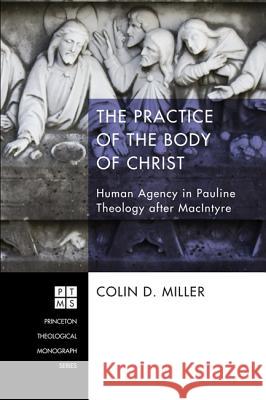The Practice of the Body of Christ: Human Agency in Pauline Theology After MacIntyre » książka
The Practice of the Body of Christ: Human Agency in Pauline Theology After MacIntyre
ISBN-13: 9781610972673 / Angielski / Miękka / 2014 / 218 str.
The Practice of the Body of Christ: Human Agency in Pauline Theology After MacIntyre
ISBN-13: 9781610972673 / Angielski / Miękka / 2014 / 218 str.
(netto: 131,53 VAT: 5%)
Najniższa cena z 30 dni: 136,23
ok. 16-18 dni roboczych.
Darmowa dostawa!
The Practice of the Body of Christ begins a conversation between ""apocalyptic"" interpretations of the Apostle Paul and the contemporary revival in ""virtue ethics."" It argues that the human actor's place in Pauline theology has long been captive to theological concerns foreign to Paul and that we can discern in Paul a classical account of human action that Alasdair MacIntyre's work helps to recover. Such an account of agency helps ground an apocalyptic reading of Paul by recovering the centrality of the church and its day-to-day Christic practices, specifically, but not exclusively, the Eucharist. To demonstrate this Miller first offers a critique of some contemporary accounts of agency in Paul in light of MacIntyre's work. Three exegetical chapters then establish a ""MacIntyrian"" rereading of central parts of the letter to the Romans. A concluding chapter offers theological syntheses and prospects for future research. ""With detailed exegesis, Miller provides an insightful articulation of Paul's theology, especially ecclesiology and the function of baptism and the Eucharist. Miller convincingly demonstrates the body of Christ is what we do, being baptized, enlivened by the Spirit, and sustained by participation in the Eucharist."" --The Right Reverend William O. Gregg, Assistant Bishop, The Episcopal Diocese of North Carolina ""Miller understands well the apocalyptic reading of Paul, but addresses here certain crucial questions that are, as yet, insufficiently developed by this interpretative trajectory. He analyzes human agency in relation to the all-important divine act in Christ, and connects this intersection in a non-individualistic way with an account of the church and its practices. . . . A highly significant and deeply intelligent set of proposals for the interpretation of Paul results."" --Douglas A. Campbell, Associate Professor of New Testament, Duke Divinity School "" I] strongly recommend this book not only for Colin's account of Paul, but just as important for how his portrayal of Paul's understanding of the church as a school for the virtues has significant implications for us. For I am sure his account of the relation between Paul's Christology and ecclesiology has profound implications for the way we think and live as Christians today. . . . This is a book only someone like Colin, a philosophically sophisticated biblical scholar and priest, could have written. And for that we should be profoundly grateful."" --From the foreword by Stanley Hauerwas, Professor of Theological Ethics, Duke Divinity School Father Colin Miller (PhD, Duke University) is Associate Rector for Urban Ministry at the Church of the Good Shepherd in Raleigh, and a member of Peter Maurin Catholic Worker House in Durham, North Carolina. This is his first book.
The Practice of the Body of Christ begins a conversation between ""apocalyptic"" interpretations of the Apostle Paul and the contemporary revival in ""virtue ethics."" It argues that the human actors place in Pauline theology has long been captive to theological concerns foreign to Paul and that we can discern in Paul a classical account of human action that Alasdair MacIntyres work helps to recover. Such an account of agency helps ground an apocalyptic reading of Paul by recovering the centrality of the church and its day-to-day Christic practices, specifically, but not exclusively, the Eucharist. To demonstrate this Miller first offers a critique of some contemporary accounts of agency in Paul in light of MacIntyres work. Three exegetical chapters then establish a ""MacIntyrian"" rereading of central parts of the letter to the Romans. A concluding chapter offers theological syntheses and prospects for future research.""With detailed exegesis, Miller provides an insightful articulation of Pauls theology, especially ecclesiology and the function of baptism and the Eucharist. Miller convincingly demonstrates the body of Christ is what we do, being baptized, enlivened by the Spirit, and sustained by participation in the Eucharist.""--The Right Reverend William O. Gregg, Assistant Bishop, The Episcopal Diocese of North Carolina""Miller understands well the apocalyptic reading of Paul, but addresses here certain crucial questions that are, as yet, insufficiently developed by this interpretative trajectory. He analyzes human agency in relation to the all-important divine act in Christ, and connects this intersection in a non-individualistic way with an account of the church and its practices. . . . A highly significant and deeply intelligent set of proposals for the interpretation of Paul results.""--Douglas A. Campbell, Associate Professor of New Testament, Duke Divinity School""[I] strongly recommend this book not only for Colins account of Paul, but just as important for how his portrayal of Pauls understanding of the church as a school for the virtues has significant implications for us. For I am sure his account of the relation between Pauls Christology and ecclesiology has profound implications for the way we think and live as Christians today. . . . This is a book only someone like Colin, a philosophically sophisticated biblical scholar and priest, could have written. And for that we should be profoundly grateful.""--From the foreword by Stanley Hauerwas, Professor of Theological Ethics, Duke Divinity SchoolFather Colin Miller (PhD, Duke University) is Associate Rector for Urban Ministry at the Church of the Good Shepherd in Raleigh, and a member of Peter Maurin Catholic Worker House in Durham, North Carolina. This is his first book.











